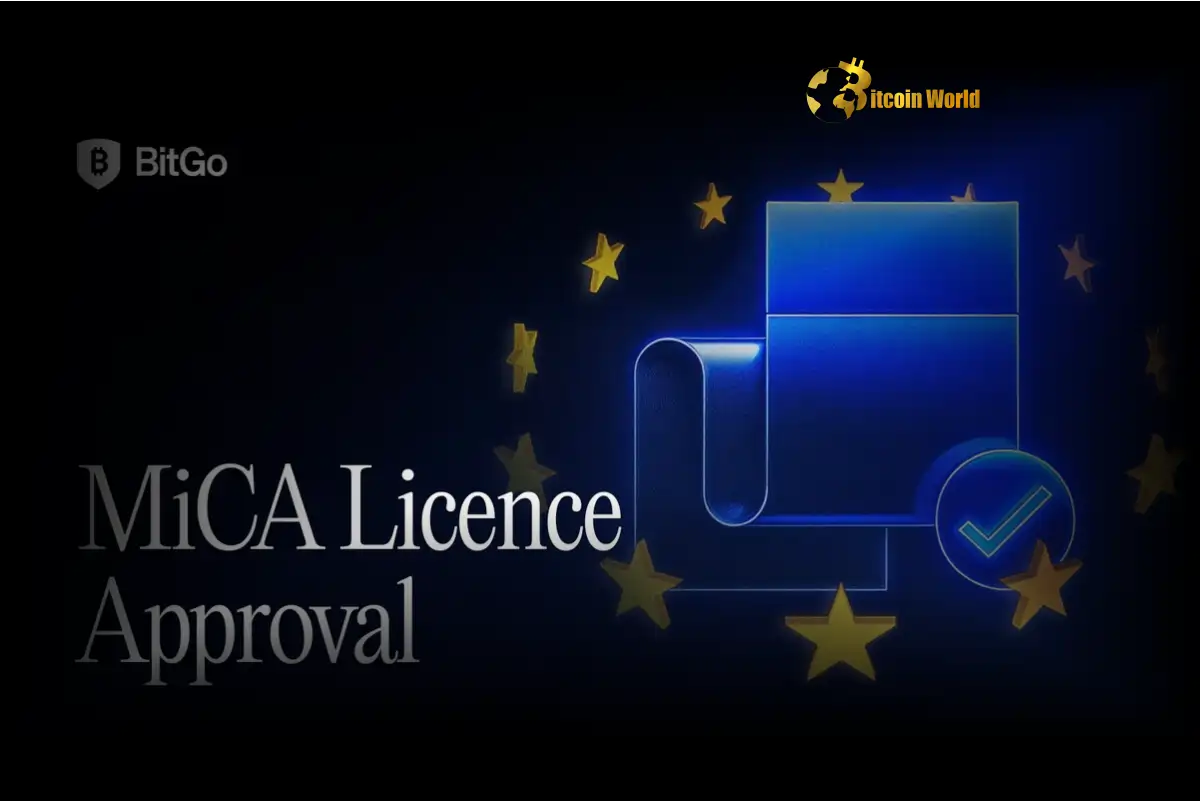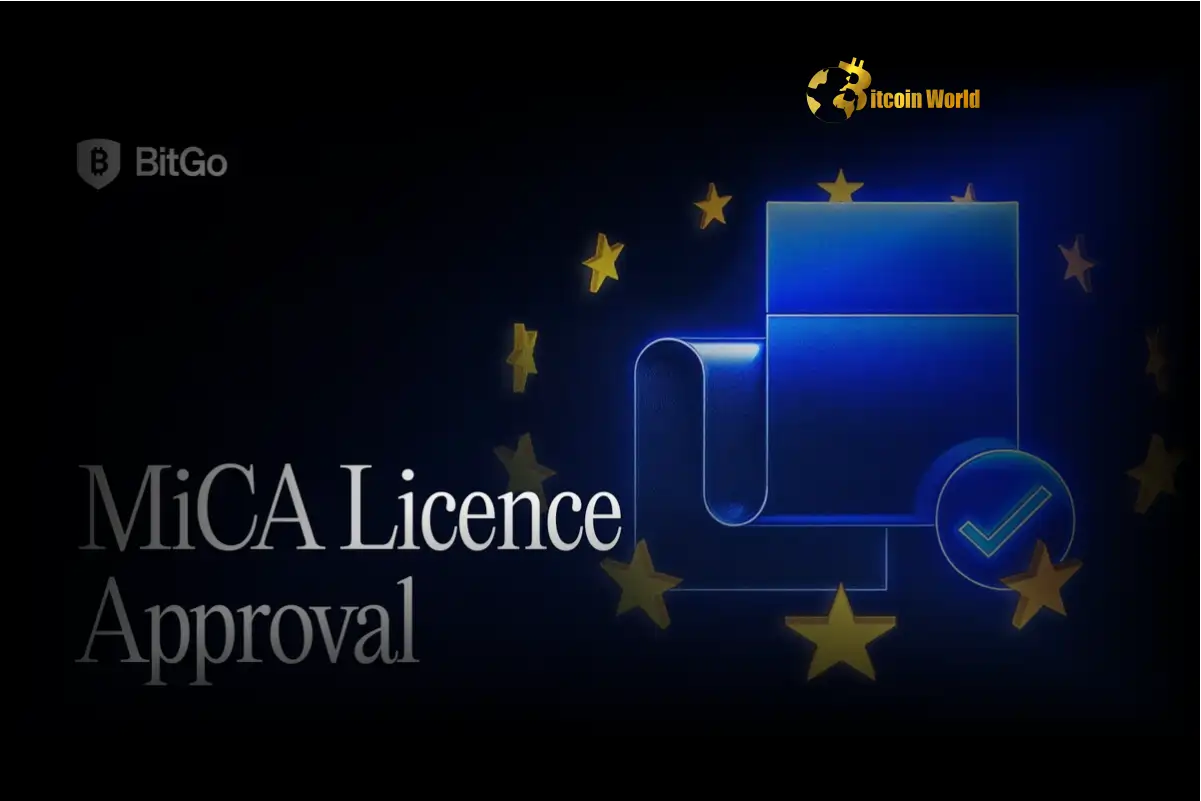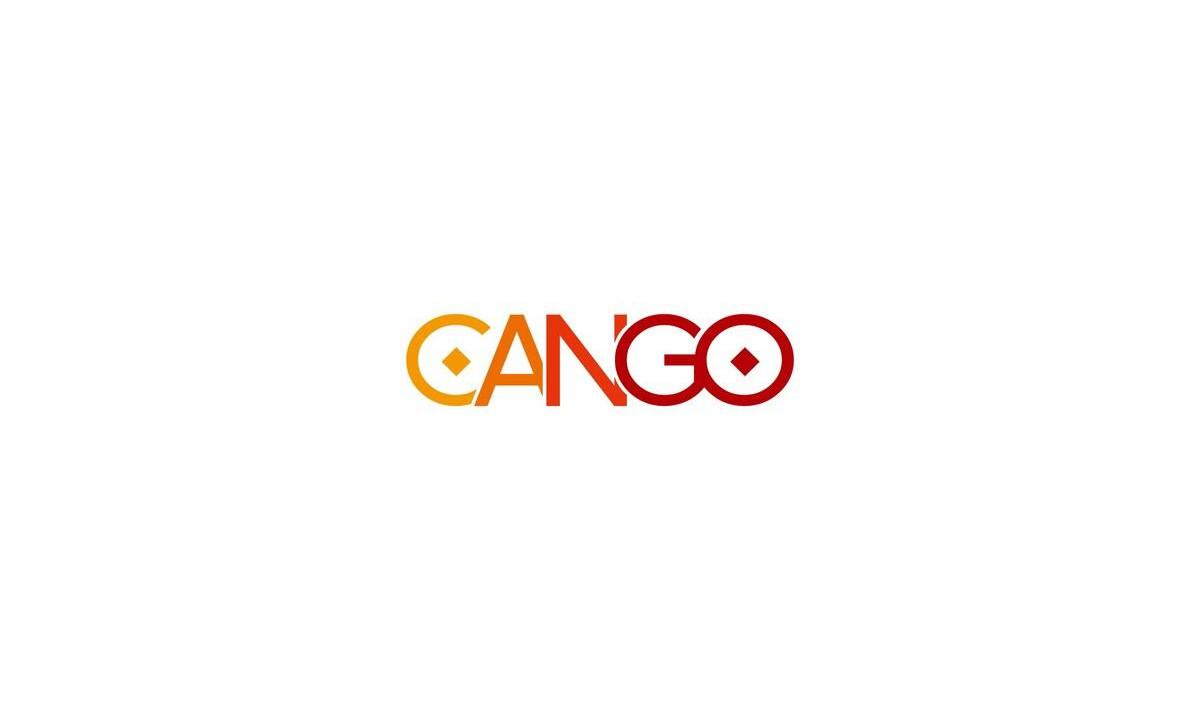The world of digital assets just took another significant stride towards mainstream adoption, spearheaded by regulatory clarity in Europe. A major player in the institutional cryptocurrency space, BitGo, has officially announced a landmark achievement: securing a Markets in Crypto-Assets (MiCA) license from Germany’s stringent financial regulator, the Federal Financial Supervisory Authority (BaFin). This isn’t just another piece of paper; it’s a pivotal moment that unlocks new possibilities for BitGo and signals growing maturity in the landscape of Germany crypto regulation.
Understanding the Significance of the BitGo MiCA License
For BitGo, obtaining the BitGo MiCA license from BaFin is a strategic triumph. MiCA is the European Union’s comprehensive regulatory framework for crypto-assets, aiming to create a harmonized legal environment across all member states. While MiCA is still being fully implemented across the EU, individual countries like Germany have been proactive in establishing their own frameworks that align with or anticipate MiCA’s requirements. Germany, known for its robust financial oversight, is often seen as a bellwether for regulatory trends in Europe. Securing a BaFin license under this evolving regime demonstrates BitGo’s commitment to compliance and positions it favorably for serving regulated entities.
What does this license specifically enable BitGo to do? It authorizes the company to provide regulated digital asset services within Germany and, importantly, sets the stage for passporting these services across the European Union as MiCA comes fully into effect. This is crucial for BitGo’s ambition to expand its footprint and offer its suite of services – primarily focused on crypto custody – to a broader range of clients.
Unpacking EU Digital Assets Regulation: What MiCA Means
The Markets in Crypto-Assets (MiCA) regulation represents a watershed moment for EU digital assets. Before MiCA, the regulatory landscape for cryptocurrencies across the EU was fragmented, with different member states adopting varying approaches. This created uncertainty for businesses operating across borders and posed challenges for investor protection and market integrity.
MiCA aims to provide legal certainty by:
- Defining different types of crypto-assets (utility tokens, asset-referenced tokens, e-money tokens).
- Establishing requirements for issuers of crypto-assets.
- Setting out rules for crypto-asset service providers (CASPs), such as exchanges, wallet providers, and custodians.
- Introducing measures to prevent market abuse and ensure market integrity.
For firms like BitGo, obtaining a license under a MiCA-aligned framework, like the one overseen by BaFin, is essential for operating legitimately within the EU. It signifies that the company meets high standards regarding capital requirements, governance, risk management, and consumer protection. This compliance is particularly appealing to traditional financial institutions looking to enter the digital asset space.
Why a BaFin License is a Game Changer for Crypto Custody
Custody is arguably one of the most critical services required for institutional adoption of cryptocurrencies. Banks, asset managers, and corporate treasuries need assurance that their digital assets are held securely, compliantly, and insured. This is where regulated crypto custody providers like BitGo come in. A BaFin license isn’t just a regulatory hurdle cleared; it’s a trust signal of immense value.
Holding a BaFin license means BitGo has undergone rigorous scrutiny of its operational processes, security infrastructure, internal controls, and financial stability. For institutional clients accustomed to the strict regulatory environment of traditional finance, this level of oversight is non-negotiable. It provides the confidence needed to allocate significant capital to digital assets, knowing that their assets are protected by a provider operating under the watchful eye of a reputable regulator like BaFin.
The license specifically allows BitGo to offer crypto custody services to a wide array of German and potentially EU-based entities, including banks, investment firms, and corporations. This opens up a massive market segment that was previously hesitant to engage with unregulated crypto service providers. The demand for secure, compliant custody solutions is growing exponentially as more institutions explore digital asset investments, and BitGo is now perfectly positioned to meet this demand in a key European market under the framework of Germany crypto regulation.
Benefits and Implications for the EU Digital Assets Market
BitGo’s successful acquisition of the BitGo MiCA license from BaFin has several positive implications for the broader EU digital assets market:
- Increased Institutional Participation: Regulated custody is a prerequisite for many traditional financial institutions. This license lowers a significant barrier, potentially leading to increased capital inflow from banks, asset managers, and corporations into the European crypto market.
- Enhanced Market Trust and Integrity: More regulated players mean higher standards of security, compliance, and transparency, which can help build trust among both institutional and retail participants and improve overall market integrity.
- Competitive Landscape: The entry of a regulated global player like BitGo under a BaFin license increases competition among service providers in the EU, potentially leading to better services and pricing for clients.
- Regulatory Harmonization: While obtained in Germany, this license aligns with the spirit and upcoming requirements of MiCA, contributing to the overall goal of a harmonized regulatory framework across the EU for EU digital assets.
- Validation of Regulatory Approach: The fact that a major international firm is seeking and obtaining licenses under frameworks like Germany’s validates the regulatory efforts being made and encourages other firms to follow suit.
This development underscores a clear trend: the future of institutional engagement with crypto is inextricably linked to regulation. Firms that prioritize compliance and successfully navigate licensing processes in key jurisdictions like Germany will be best placed to capture the growing institutional market share.
What’s Next for BitGo and Crypto Custody in Europe?
With the BitGo MiCA license secured, the company is poised for significant expansion. While the initial focus will be on leveraging the BaFin license within Germany, the anticipation is that this will pave the way for BitGo to ‘passport’ its services across other EU member states once MiCA is fully implemented. This means BitGo could offer its regulated crypto custody and other digital asset services throughout the EU bloc with relative ease, operating under a single regulatory umbrella.
Challenges remain, of course. The regulatory landscape, even under MiCA, is complex and evolving. Maintaining compliance across multiple jurisdictions requires significant resources and expertise. Competition in the regulated custody space is also increasing as more players seek licenses.
However, the strategic advantage gained by being an early recipient of a significant license under a MiCA-aligned framework in a major EU economy like Germany cannot be overstated. It signals readiness, capability, and a long-term commitment to serving the institutional market compliantly. This move by BitGo is a clear indicator of the direction the industry is heading – towards a more regulated, mature, and institutionally-friendly ecosystem for EU digital assets.
Conclusion: A New Chapter for BitGo and Germany Crypto Regulation
BitGo’s announcement marks a significant milestone, not just for the company, but for the broader acceptance and integration of digital assets into the traditional financial system within Europe. By securing a crucial BaFin license under the framework aligning with MiCA, BitGo has positioned itself as a leading provider of regulated crypto custody and digital asset services in a key EU market. This move will likely accelerate institutional adoption, enhance market trust, and contribute to the development of a more robust and compliant ecosystem for EU digital assets under the evolving landscape of Germany crypto regulation. It’s a powerful step forward, underscoring the increasing importance of regulatory compliance for success in the digital asset space.
To learn more about the latest crypto market trends, explore our article on key developments shaping digital asset institutional adoption.






